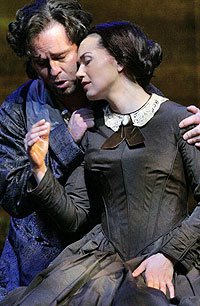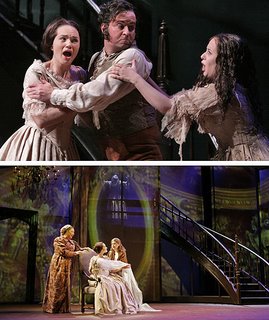Monday, June 05, 2006
7:17 pm by M.

The first reviews and pictures from yesterday's
US Premiere of Michael Berkeley's Jane Eyre have been published on
Saint Louis Today (review by Sarah Bryan Miller) and
PlayBill (photos by Ken Howard).
The story is short and seriously compressed, beyond mere telescoping. The score is musically and dramatically intense. But if you don’t go to opera primarily for pretty tunes and pretty costumes, Michael Berkeley’s "Jane Eyre" might just prove to be your cup of tea.
Seen at its American premiere at Opera Theatre of St. Louis on Sunday night, "Jane Eyre" doesn’t pull any punches. At just 80 minutes, it may be too tightly written for the drama it explores. David Malouf’s libretto, from Charlotte Bronte’s classic novel, jettisons all of the early part of Jane’s story and most of the details of her time at Thornfield. If you never got as far as "Reader, I married him," or if it’s been a few years since last you read the book (or saw a movie treatment), be sure to take the time to read the synopsis before the lights go down. This one goes by awfully quickly.
Berkeley’s score, however, effectively conveys the menace of Thornfield, the madness of its hidden mistress, the anguish of Mr. Rochester, and Jane’s own evolving emotions. It opens effectively, with the low winds, and builds spikily to its climax. Berkeley has a real gift for orchestration, and he uses his small group of instrumentalists with consummate skill.
He quotes briefly from Britten’s "The Turn of the Screw," and frequently from Donizetti’s "Lucia di Lammermoor." Berkeley and Malouf have drawn a not-altogether-convincing connection between criminally insane Bertha Rochester and unstable Lucy Ashton, who went mad when forced to marry the wrong tenor and murdered her groom on their wedding night. I’m not sure a close reading of Bronte supports that conclusion, but it does make Bertha into a far more interesting and sympathetic character than the raging beast that’s usually portrayed.
Opera Theatre’s artistic director, Colin Graham, has staged "Jane" for the maximum dramatic impact, helping his excellent cast to bring out the essence of their characters. He is ably assisted by Erhard’s simple sets and atmospheric projections in bringing out the  claustrophobic nature of the story and the Gothic gloom of the house.
claustrophobic nature of the story and the Gothic gloom of the house.
The small, excellent cast is headed by soprano Kelly Kaduce in the title role. Kaduce is a strong actor; she captures both Jane’s matter-of-factness and her anguish at the discovery of Rochester’s proposed bigamy. Singing with a large, clear, well-produced voice, she brought the character to life.
Baritone Scott Hendricks made a reasonably Byronic Edward Rochester; he brooded nicely, and sang strongly and with presence. Mezzo-soprano Elizabeth Batton’s Bertha Rochester made the role her own, with a rich, dark voice and edgy air of madness. As Mrs. Fairfax, mezzo-soprano Robynne Redmon made clear both the housekeeper’s essential decency and her role in Rochester’s deception, and sang well. Soprano Adele Reiter sang sweetly as Adele, and made a convincing child.
Jane Greenwood’s costumes were perfectly in period, and perfect for these characters. In the pit, conductor Andreas Mitisek and members of the St. Louis Symphony Orchestra handled the difficult, complicated score with aplomb. Photos: Scott Hendricks and Kelly Kaduce as Rochester and Jane (top); Kaduce, Hendricks, and Elizabeth Batton as Rochester, Jane, and Mrs. Rochester (middle); Redmon as Mrs. Fairfax, Kaduce as Jane, Elizabeth Reiter as Adele, and Batton (rear) as Mrs. Rochester (bottom) (Photos by Ken Howard).
Categories: Music, Opera, Jane_Eyre, In_the_News










0 comments:
Post a Comment